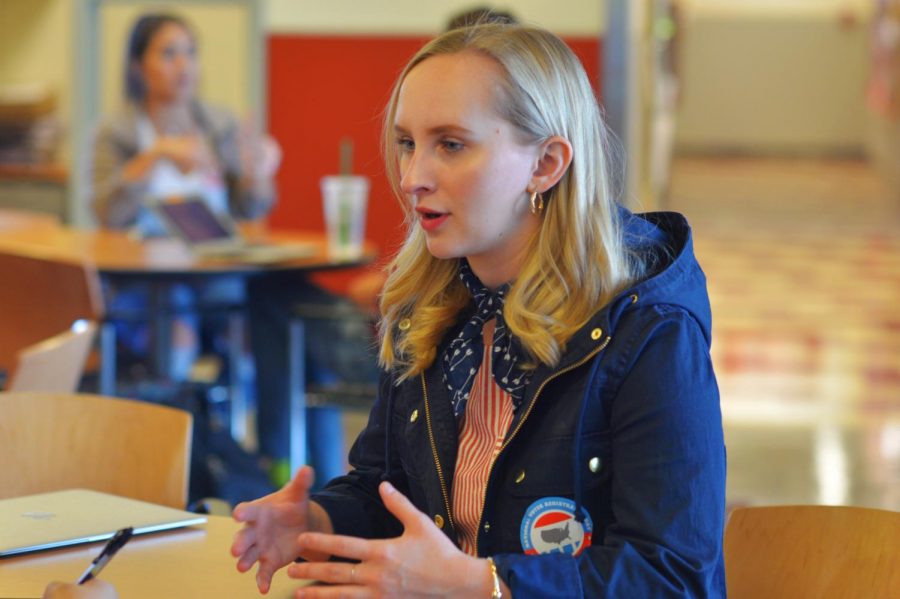Student Code of Conduct updated to specify values
Mandatory training for members included, designed to replace ‘antiquated’ predecessor
DAVID PEDRAZA | THE DAILY EVERGREEN
ASWSU President Savannah Rogers explains the Student Code of Conduct on Tuesday in the CUB.
September 27, 2018
The WSU Student Code of Conduct recently underwent an update that is being released today, which includes term limits and mandatory training for the Student Conduct Board, changes in the code’s language to make it easier to understand and specifying a set of values WSU students are expected to uphold.
The new code will not take effect until any and all possible changes are processed by WSU’s Board of Regents. Mary Jo Gonzales, vice president of Student Affairs, said a discussion board will be made available on Oct. 17 for three weeks, allowing comments on the update to be made by students and others affected.
In early November there will be a public hearing held by the Board of Regents in which members will accept questions and comments from those associated with WSU. Given that all events proceed in a timely fashion, the code will be implemented by January 2019, Gonzales said.
“The [current] code of conduct was antiquated,” said Dan Bernardo, WSU provost and executive vice president.
There was “an accumulation of issues that had arisen over [the last] several years,” Bernardo said, which led to the need for a new code.
In late 2016, a specialized task force convened to begin the discussion of possible solutions to a code that “did not contain enough details,” to be properly applied to the current system, Bernardo said.
The task force — formed by students, faculty and alumni — produced a set of 32 recommendations. The recommendations were reviewed by a team formed from employees and members of Student Affairs, Student Conduct, Dean of Students and the Attorney General’s office, Gonzales said.
The new code demands that those who are appointed to the Conduct Board, a group consisting of mostly students who rule on cases involving violations of the Student Code of Conduct, must complete an application process. Those assigned have a four-year term limit in which they are to remain on the board.
Those who are appointed to the board must have completed training surrounding the topics of how to avoid bias and treat individuals of specific identities, including race and gender.
Students who violate the new code of conduct will be clearly informed of their rights. These, Gonzales said, include rights to due process, a conduct adviser and the ability to request the removal of a hearing officer or Conduct Board member in the event of a conflict of interest.
The new code also dictates there must be a periodic review of the code every three years to ensure up-to-date policies and procedures. This, Bernardo said, will allow for a “natural progression” in the improvement of the code as time passes.
A noticeable change in the new code will be the language in which it is written.
“It should be transparent and more accessible to students,” Gonzales said. “[Students] deserve to understand … Everybody is going to make mistakes … those mistakes do not have to last a lifetime if you learn from them.”
Along with acting in accordance to the code, Gonzales said she hopes for students to instill the values described in the code into their personal lives even after leaving WSU.
“My main goal is to provide help to students, as they go through this time of great ‘adulting’ — that’s what my daughter calls it,” Gonzales said. “[The code] describes what it means to be a member of the Cougar family … and how to be a member of society.”
The code will be distributed to students via a notification sent to their WSU accounts, ASWSU President Savannah Rogers said. Links to the updated code will be shared on multiple social media platforms that host official WSU profiles.
A social media campaign, #BeThatCoug, will be launched, promoting adherence to community standards expressed in the code.
“Ignorance is not a justification in the realm of student conduct,” Rogers said.




















